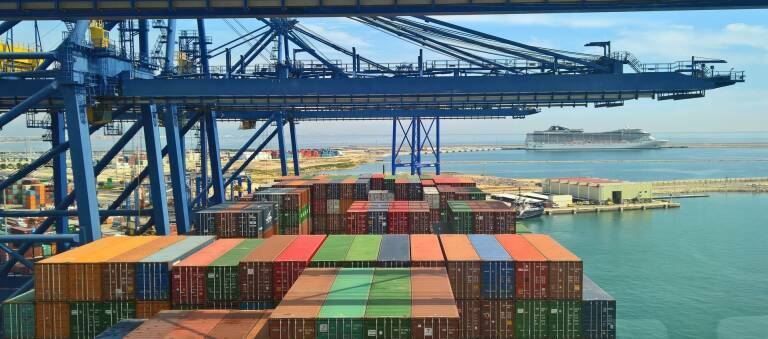Valencian exports have grown by 12.9% in January 2022 but have decreased by 1.7% compared to December and have been surpassed in volume by imports by 284.2 million euro.
Exports reached 2,8 billion euro (+12.9%) and increased in the three provinces, percentage-wise more in Castellón, while imports accounted for 3,1 billion, 52.2% more than the same period of the previous year.
The trade balance coverage rate stood at 90.8%, which represents 31.7 points less than a year ago, according to the monthly Foreign Trade report of the Ministry of Industry, Trade and Tourism for January.
By volume of sales, the food sector was the only one with a year-on-year decrease in sales abroad, of 19.1% due to decreases in citrus fruits and meat products; the automobile sector recovered its exports with 24.1% more; and non-chemical semi-manufactures, chemical products and capital goods registered increases of 33.4%, 23.5% and 1.1%, respectively.
The main contributions to the growth of exports in the Valencian Community came from the non-chemical semi-manufactured sector (contribution of 4.9 points), the automobile sector (3.9 points), energy products (3 points) and chemical products (2. 9 points). On the other hand, those that contributed the most negatively were the food, beverage and tobacco sectors (-5.3 points).
Regarding imports of the Valencian Community, the main positive contributions came from the sectors of energy products (13.1 points), non-chemical semi-manufactured products (9.2 points), chemical products (8.7 points) and capital goods (8 points), while in the food, beverage and tobacco sectors (-1.1 points) they were negative.
Europe received 70.2% of the total exports of the Valencian Community -the EU 59.3%-, with decreases in Germany (-20.2%) and increases in France (+4.8%) and Italy (47.8%), the main destinations of exported goods.
In the rest of Europe, sales to Turkey were up 97.5% and sales to the UK were down 22.9%.
In year-on-year terms, the weight of Valencian exports to EU countries fell to the benefit of those destined for third countries. The share of sales to the EU stood at 59.3% of the total, a percentage lower than the 61% registered in January 2021, a loss that was distributed between the euro zone (51.6% compared to 53% of the same month of the previous year) and the rest of the EU (7.7% compared to 8% in January 2021).
Outside Europe, exports to all major area categories rose: Latin America (91.6%), Africa (32.4%), Middle East (23.8%), North America (18.7%), Oceania (16.2%) and Asia excluding the Middle East (8.1%).
By country, the increases in Argentina (507.4%), Singapore (67.5%), Mexico (46.8%), Chile (46.7%), Morocco (40.7%), Taiwan (35.5%), Indonesia (33.2%) and South Korea (32.1%), and negatively South Africa (-34%), India (-32.5%), Saudi Arabia (-22.6%), United Arab Emirates (-14.1%), Nigeria (-13.9%), Japan (-11.5%), Vietnam (-6.3%) and Australia (-3.9%).
Knowing these data, the Minister of Sustainable Economy, Productive Sectors, Commerce and Labour, Rafa Climent, has highlighted that in January the trend of recovery and growth with which the year ended was maintained, and the Valencian is ranked as the third autonomy exporter.





